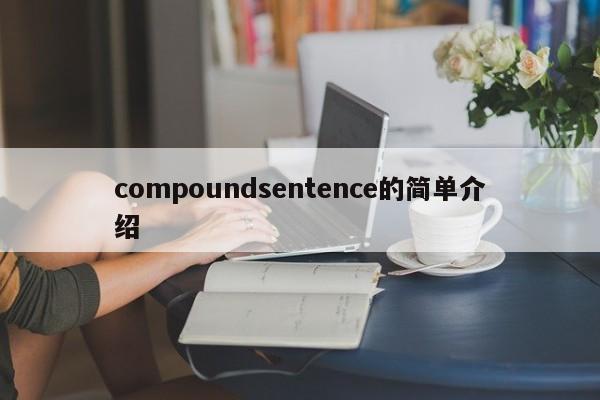compoundsentence的简单介绍
本文主要给大家带来compoundsentence内容,从不同角度解读有关compoundsentence、,其中包含compoundsentence日常生活中的应用和专业领域的应用,下面就跟随斗笠网小编一起了解compoundsentence。
文章目录>>>
- 1、simple sentence;compound sentence;complex sentence;compound-complex sentence怎么区分啊
- 2、compound sentences是什么?
- 3、什么是compound sentence?有两个主语的算吗?
- 4、compound sentence和complex sentence的区别是什么?
- 5、英语compound setences怎么翻译?
- 6、compound sentence和complex sentence的区别
simple sentence;compound sentence;complex sentence;compound-complex sentence怎么区分啊
simple sentence是简单句,compound sentence是并列句,complex sentence是复合句,最后的compound-complex sentence是并列复合句。这几种句式的区别见下:
1、从复杂程度来看
简单句最简单,简单句中只包含一个句子,其最基础的形式就是主语加上谓语,并在此基础上衍生出其他的形式。而剩下的并列句、复合句还有并列复合句中都不只包含一个句子,他们最少有两个简单句构成。其中,并列复合句最为复杂,它既包含了并列句又包含了复杂句。
并列复合句的例子:I’d love to go to the party, but I can’t go because I have a class.
翻译:我很想去参加派对,但我不能去因为我还有课。
简单句的例子:I am reading a book.
翻译:我在看书。
2、从有无并列连词来看
简单句有可能也会出现and、but等连词,但这些连词只是连接简单的词汇或是短语,而不是句子。而并列句中,连词会把两个或以上的句子连在一起组成一个句子。在并列复合句中,因为该句式中包含了并列句,因此也会有连词。
简单句连词连接词汇的例子:I like pear and passionfruit.
翻译:我喜欢梨子和百香果。
并列句中连词链接句子的例子:I like playing football but I don’t like playing basketball.
翻译:我喜欢踢足球但我不喜欢打篮球。
3、从句子的地位来看
除了简单句外,其他三种句式都是由两个或以上的句子构成的。在并列句中,两次前后的简单句的关系是平等并列的,并没有一个比另一个重要。而复合句虽然也是由多个个句子组成的,但句子的地位是不平等的,复合句中的主句是核心,从句是次要的部分,它只是句子中的一个成分。
复合句的例子:I have no idea about when I should go.
翻译:我不知道我该什么时候走。
参考资料来源:百度百科——句类
compound sentences是什么?
compound sentences
复合句
复合 [ fù hé ]
生词本
基本释义 详细释义
[ fù hé ]
合在一起;结合起来:~词。~元音。~材料。

什么是compound sentence?有两个主语的算吗?
不明白你说的两个主语是什么意思
compound sentence包括两个独立的句子,但是两个句子之间必须用连词and, or,but,for等连词相连
比方说:
She did not cheat on the test, for it was not the right thing to do.
I think I will buy the red car, or I will lease the blue one.
compound sentence和complex sentence的区别是什么?
complex sentence:复合句
compound sentence:并列句
复合句和并列句的区别:
复合句(Compound Sentence)分为并列复合句和主从或从属复合句,并列复合句是有并列连词:and、or、but连接;从属复合句由一个主句(Principal Clause)和一个或一个以上的从句(Subordinate Clause)构成。用疑问词作引导词,主句是全句的主体,通常可以独立存在;从句则是一个句子成分,不能独立存在。从句不能单独成句,但它也有主语部分和谓语部分,就像一个句子一样。所不同在于,从句须由一个关联词(connective)引导。 根据引导从句为主不同,大致可分为:主语从句、表语从句、宾语从句、定语从句、状语从句等。
由并列连词把两个或两个以上的简单句连在一起的句子叫并列句。不同的并列连词表示并列分句之间的不同关系。
从属复合句可分为:
1).定语从句(The Attributive Clause);
2).状语从句(The Adverbial Clause);
3).名词性从句(The Noun Clause);
一、定语从句
1、定语从句的定义:定语从句在句中作定语,用来修饰一个名词、名词词组或者代词。
2、先行词和引导词:被修饰的名词、名词词组或代词叫做先行词;在先行词和定语从句之间起连接作用的词叫做引导词。引导词分为"关系代词"和"关系副词"。
3、关系代词和关系副词
关系代词有:who, whom, whose, that, which, as。
关系副词有:when, where, why。 注意:关系副词里面没有how。
如果要修饰方式,用that或in which引导,或者不用引导词。
I don't like the way (不用引导词.that, in which) he eyed me.
我不喜欢他看我的那个样子。
4、关系代词:who
关系代词who在从句中主要作主语,在非正式语体里who还可以作从句中的宾语。
He is the man who wants to see you.
He is the man who I saw in the park yesterday.
5、关系代词:whom
He is the man(whom)I saw in the park yesterday.
(whom在从句中作宾语)
6、关系代词:whose
whose 用来指人或物,(只能用作定语, 若指物,它还可以同of which互换)。
They rushed over to help the man whose car had broken down.
Please pass me the book whose cover is green. (of which the cover/the cover of which)
7、关系代词:which(1)
which指物,在从句中作主语或宾语,作宾语时在非正式语体中可以省略。
They needed a plant which didn't need as much water as rice.
The farm (which) we visited yesterday is located in the suburb of Beijing.
8、关系代词:which(2)
当在which和that面前进行选择的情况下,一般情况下要选which:
1)在非限制性定语从句中通常用which作引导词,而不能用that做非限制性定语从句的引导词。
2)修饰整个主句。
I never met Julia again after that, which was a pity.
3)修饰谓语部分。
He can swim in the river, which I cannot.
4)介词+ which
They are all questions to which there are no answers.
9、关系代词:that(1)
that多用来指物,有时也可以用来指人;在从句中作主语或宾语。指物的时候多用that,也可用which。
It's a question that (which) needs careful consideration.
(指物,作主语。)
Who is the man that is reading a magazine under the tree?
(指人,作主语。)
The girl (that) we saw yesterday is Tom's sister.
(指人,作宾语,可省略。)
10、关系代词:that(2)
在以下的情况中,只能用that作引导词,而不能用which作引导词。
1)先行词为all , everything, anything, nothing, little等不定代词时。
All(that)she lacked was training.
2)先行词被形容词最高级修饰时
This is the best film that I have ever seen.
3)先行词被序数词和the last修饰时
4)先行词中既有人又有物时
They talked about the teachers and the schools that they had visited.
5)主句是含有who或which的特殊疑问句,为了避免重复时
二、并列句
1、并列句概念:两个或两个以上的简单句用并列连词连在一起构成的句子,叫做并列句,其基本结构是"简单句+并列连词+简单句"。并列连词有:and,but,or,so等.并列句中的各简单句意义同等重要,相互之间没有从属关系,是平行并列的关系。它们之间用连词连结。
如:
I like action movies but don't like thrillers.
Hurry up or you'll be late. (快点,否则你要迟到了。)
and,or和but都是连词,在句中连接两个或两个以上的并列成分。可连接两个词,两个短语,两个分句,但所连接的两个成分必须一致,绝不能一个是词,一个是句子。如:
I like red and orange.
He isn't my brother or my friend.
I like playing football and swimming.
and 的意思是"和",表示前后两个成分的并列或对称关系;or的意思是"或者"、"否则"、 "要不然",表示两个成分并列或选择关系;but 的意思是"但是",表示两个成分之间的转折关系。
并列句中:
1)表并列关系的 由and,both...and,as well as,not only...but (also),neither...nor等组成。
She not only sings but also dance.
2)表转折关系的 与but,however(然而),while(然而),still,yet等连用。
The film is not perfect,still,it's good.
3)表选择关系的 由or,either...or...,not...but...,or else(否则)连接
Take the chance,or else you will regret(后悔) it.
4)表因果关系的 与for,so/so that,therefore(因此),because等连用。
I'd better take an umbrella,for it is going to rain.
英语compound setences怎么翻译?
最好不要翻译,非要翻译的话,那就随便,只要你能记住就行,或者依着老师的翻译来即可。
compound sentences,由两个独立从句(clause)组成的句子(sentence)
complex sentences,由一个独立从句与一个非独立从句组成的句子
compound sentence和complex sentence的区别
complex sentence:复合句
compound sentence:并列句
复合句和并列句的区别:
复合句(Compound Sentence)分为并列复合句和主从或从属复合句,并列复合句是有并列连词:and、or、but连接;从属复合句由一个主句(Principal Clause)和一个或一个以上的从句(Subordinate Clause)构成。用疑问词作引导词,主句是全句的主体,通常可以独立存在;从句则是一个句子成分,不能独立存在。从句不能单独成句,但它也有主语部分和谓语部分,就像一个句子一样。所不同在于,从句须由一个关联词(connective)引导。 根据引导从句为主不同,大致可分为:主语从句、表语从句、宾语从句、定语从句、状语从句等。
由并列连词把两个或两个以上的简单句连在一起的句子叫并列句。不同的并列连词表示并列分句之间的不同关系。
从属复合句可分为:
1).定语从句(The Attributive Clause);
2).状语从句(The Adverbial Clause);
3).名词性从句(The Noun Clause);
一、定语从句
1、定语从句的定义:定语从句在句中作定语,用来修饰一个名词、名词词组或者代词。
2、先行词和引导词:被修饰的名词、名词词组或代词叫做先行词;在先行词和定语从句之间起连接作用的词叫做引导词。引导词分为"关系代词"和"关系副词"。
3、关系代词和关系副词
关系代词有:who, whom, whose, that, which, as。
关系副词有:when, where, why。 注意:关系副词里面没有how。
如果要修饰方式,用that或in which引导,或者不用引导词。
I don't like the way (不用引导词.that, in which) he eyed me.
我不喜欢他看我的那个样子。
4、关系代词:who
关系代词who在从句中主要作主语,在非正式语体里who还可以作从句中的宾语。
He is the man who wants to see you.
He is the man who I saw in the park yesterday.
5、关系代词:whom
He is the man(whom)I saw in the park yesterday.
(whom在从句中作宾语)
6、关系代词:whose
whose 用来指人或物,(只能用作定语, 若指物,它还可以同of which互换)。
They rushed over to help the man whose car had broken down.
Please pass me the book whose cover is green. (of which the cover/the cover of which)
7、关系代词:which(1)
which指物,在从句中作主语或宾语,作宾语时在非正式语体中可以省略。
They needed a plant which didn't need as much water as rice.
The farm (which) we visited yesterday is located in the suburb of Beijing.
8、关系代词:which(2)
当在which和that面前进行选择的情况下,一般情况下要选which:
1)在非限制性定语从句中通常用which作引导词,而不能用that做非限制性定语从句的引导词。
2)修饰整个主句。
I never met Julia again after that, which was a pity.
3)修饰谓语部分。
He can swim in the river, which I cannot.
4)介词+ which
They are all questions to which there are no answers.
9、关系代词:that(1)
that多用来指物,有时也可以用来指人;在从句中作主语或宾语。指物的时候多用that,也可用which。
It's a question that (which) needs careful consideration.
(指物,作主语。)
Who is the man that is reading a magazine under the tree?
(指人,作主语。)
The girl (that) we saw yesterday is Tom's sister.
(指人,作宾语,可省略。)
10、关系代词:that(2)
在以下的情况中,只能用that作引导词,而不能用which作引导词。
1)先行词为all , everything, anything, nothing, little等不定代词时。
All(that)she lacked was training.
2)先行词被形容词最高级修饰时
This is the best film that I have ever seen.
3)先行词被序数词和the last修饰时
4)先行词中既有人又有物时
They talked about the teachers and the schools that they had visited.
5)主句是含有who或which的特殊疑问句,为了避免重复时
二、并列句
1、并列句概念:两个或两个以上的简单句用并列连词连在一起构成的句子,叫做并列句,其基本结构是"简单句+并列连词+简单句"。并列连词有:and,but,or,so等.并列句中的各简单句意义同等重要,相互之间没有从属关系,是平行并列的关系。它们之间用连词连结。
如:
I like action movies but don't like thrillers.
Hurry up or you'll be late. (快点,否则你要迟到了。)
and,or和but都是连词,在句中连接两个或两个以上的并列成分。可连接两个词,两个短语,两个分句,但所连接的两个成分必须一致,绝不能一个是词,一个是句子。如:
I like red and orange.
He isn't my brother or my friend.
I like playing football and swimming.
and 的意思是"和",表示前后两个成分的并列或对称关系;or的意思是"或者"、"否则"、 "要不然",表示两个成分并列或选择关系;but 的意思是"但是",表示两个成分之间的转折关系。
并列句中:
1)表并列关系的 由and,both...and,as well as,not only...but (also),neither...nor等组成。
She not only sings but also dance.
2)表转折关系的 与but,however(然而),while(然而),still,yet等连用。
The film is not perfect,still,it's good.
3)表选择关系的 由or,either...or...,not...but...,or else(否则)连接
Take the chance,or else you will regret(后悔) it.
4)表因果关系的 与for,so/so that,therefore(因此),because等连用。
I'd better take an umbrella,for it is going to rain.
有关compoundsentence分享到这里,希望以上斗笠网小编分享的compoundsentence和{能给大家带来帮助,如果你还有对compoundsentence的疑问欢迎通过下方留言,斗笠网小编会第一时间进行答复。

